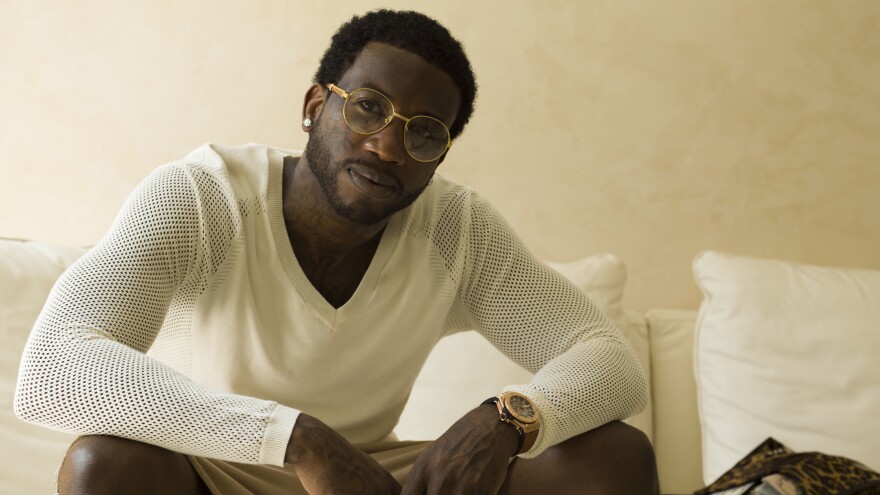Gucci Mane has had a roller coaster of a career. Born Radric Davis, he grew up in his grandfather's house in a small town in Alabama. He made his name in Atlanta, over time becoming a central figure in Southern rap and a mainstay on commercial radio. But his successes were interrupted by time in jail.
Most recently, he pleaded guilty to gun charges in 2014. He was released early from a federal penitentiary this May, and he recorded a song, "1st Day Out Tha Feds," the day he got home.
In his new music, Gucci is explicit about his paranoia and his worries — a departure from his previous releases. Before he went to prison, he says, "Most of [his] subject matter was party stuff, jewelry and cars — it was really just shallow."
But critics and fans admired his creativity within those thematic constraints. His 2009 song "Lemonade" went platinum twice. Gucci's tone was dry, but his lines were playful. And though the drums were hard, there was always something pretty in the melody. These qualities became central to the work of the high-profile musicians he mentored.
Gucci rattles off the names of his mentees like it's no big deal: "OJ da Juiceman, Mike Will, Nicki Minaj, Thug, Waka, Young Dolph, Peewee Longway, Scooter, the Migos, Southside, TM, Metro Boomin," he says. They represent millions of plays, streams and views — and millions of dollars. They have provided the soundtrack to millions of lives.
"I come from very, very humble beginnings ... we really ain't have nothing. So for me to be where I'm at now, to be a multimillionaire and help other people be multimillionaires, I'm so proud," he says, adding that he wants his story to inspire others. "I hope my life is a testimony to show people that no matter what you go through ... to pick yourself up and be resilient and keep on trucking."
Gucci has had to deal with the emotional fallout of his constant proximity to violence and chaos. Drug addiction has dogged him. He's been convicted of assault charges; he's also been attacked. One incident led to a murder charge that was later ruled self-defense and dropped.
In his songs, Gucci would detail what he was seeing, but says he wasn't rapping about how he felt. "I was trying to keep it private because I didn't want to scare people away," he says. "But once I went to prison, all that stuff in the past — I'm open to talk about it. That's why I wrote a book."
Gucci's memoir will be published by Simon & Schuster in 2017. This year, he put out 10 projects — including a holiday-themed tape last week. He's clean and sober, and he's also performing again.
His longtime musical collaborator, Zaytoven, says he can see the change in his friend. "I remember when he performed and he was just slouching and sluggish and didn't really care to perform," he says. "Now, he excited — he ready to perform. I love to see that."
Zaytoven has had a hand in almost every one of Gucci's nearly 100 releases over the past 11 years. Back when they were first starting out, Zaytoven's studio was in his mother's basement. He says she wasn't too thrilled about the situation — until they started making some real hits.
"When 'So Icy' got on the radio and some money came in, they were like, 'Y'all don't need no snacks down there?'" he says. "Everything changed then."
Eventually, the duo ended up at NPR's headquarters, with Gucci playing a Tiny Desk Concert and Zaytoven backing him up on piano. The venue might be a little different from what he's used to, but Gucci is well acquainted with NPR. "I was in the federal prison system, and people [there] stay tuned to NPR," he says. "So I know that they're going to hear this."
I asked him what he'd like to say to people listening inside. "Don't never drop your head," he says. "Don't never feel you counted out. I always have faith that something's gonna happen good for you, and it's gonna happen."
The Internet has been full of fans saying that if Gucci can overcome, maybe they can too.
Copyright 2021 NPR. To see more, visit https://www.npr.org. 9(MDEyMzg0OTk0MDEzODE1MjM2ODE2ODgyMg004))



